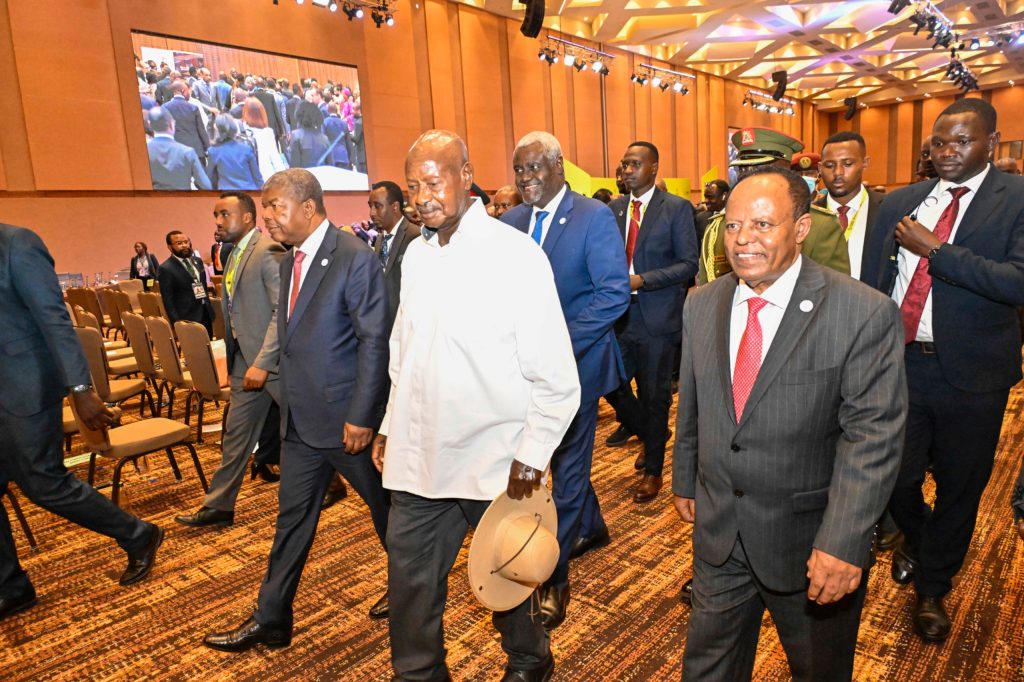President Yoweri Kaguta Museveni of Uganda delivered a compelling speech at the Extraordinary African Union Summit on the Post-Malabo Comprehensive Africa Agriculture Development Programme (CAADP), held in Munyonyo, Kampala. The President emphasized the urgent need for agricultural transformation, value addition, and regional economic integration to propel Africa towards self-sufficiency and prosperity.
Harnessing Africa’s Agricultural Potential
President Museveni highlighted the vast agricultural potential of Africa, noting that much of the continent’s economy remains anchored in subsistence farming and raw material exports. He described Uganda’s journey from a pre-colonial subsistence economy to a modern commercial agricultural framework. However, he acknowledged that significant challenges remain, particularly in fully integrating value addition into agricultural processes.
Museveni argued for the importance of balancing intensive and extensive agricultural practices to ensure food security and family income. He identified high-value crops such as coffee, fruits, and dairy as critical for small-scale farmers, while extensive crops like cotton and tea could generate sustainable incomes for families with larger landholdings.
“Africa cannot remain a donor of raw materials to developed economies,” he remarked, stressing that value addition would not only increase income but also create jobs for African youth. He lamented the current state where Africa’s resources benefit foreign economies while the continent struggles with poverty and unemployment.
Lessons from Uganda’s Experience
President Museveni shared Uganda’s success in integrating agriculture with other sectors such as manufacturing and services. He pointed to advancements in processing dairy, fish, sugar, and wood products as examples of progress.

He also lauded local scientific research for producing improved seeds and emphasized the importance of modern farming practices like irrigation, pest control, and soil fertility restoration.
He underscored the need to discourage land fragmentation due to inheritance, describing it as creating “Land with Disability” that cannot support large-scale farming. The President proudly noted that 67% of Ugandan households are now part of the money economy, a significant leap from 9% at independence.
Overcoming Challenges in Regional Trade
Museveni also addressed issues hindering agricultural trade within Africa, particularly non-tariff barriers (NTBs). He criticized some African countries for blocking Ugandan agricultural exports during times of surplus, only to face shortages later. “How will African agriculture sustainably advance with this erraticness?” he asked, advocating for the elimination of NTBs to support the African Continental Free Trade Area (AfCFTA).
Water Resources and Sustainability
Highlighting the importance of water for both livelihoods and production, President Museveni urged African nations to address water management challenges. He proposed leveraging unused resources, such as the Congo River’s vast water reserves, to support water-stressed regions. He also called for investment in desalination technologies to address water shortages in Northern and Southern Africa.
A Call for Unity and Transformation
Concluding his speech, Museveni reiterated Africa’s need for socio-economic transformation through agriculture. He called on African nations to move away from dependence on colonial-era practices and adopt a modern, integrated approach that ensures food security, economic resilience, and sustainable growth.
“The Africa of food shortages and begging is not the real Africa but a product of colonial and neo-colonial mismanagement,” he said, urging leaders to work together for a prosperous and self-reliant continent.
The summit highlighted Africa’s shared vision of agricultural and economic transformation, with Uganda leading by example in integrating agriculture into its broader development agenda.